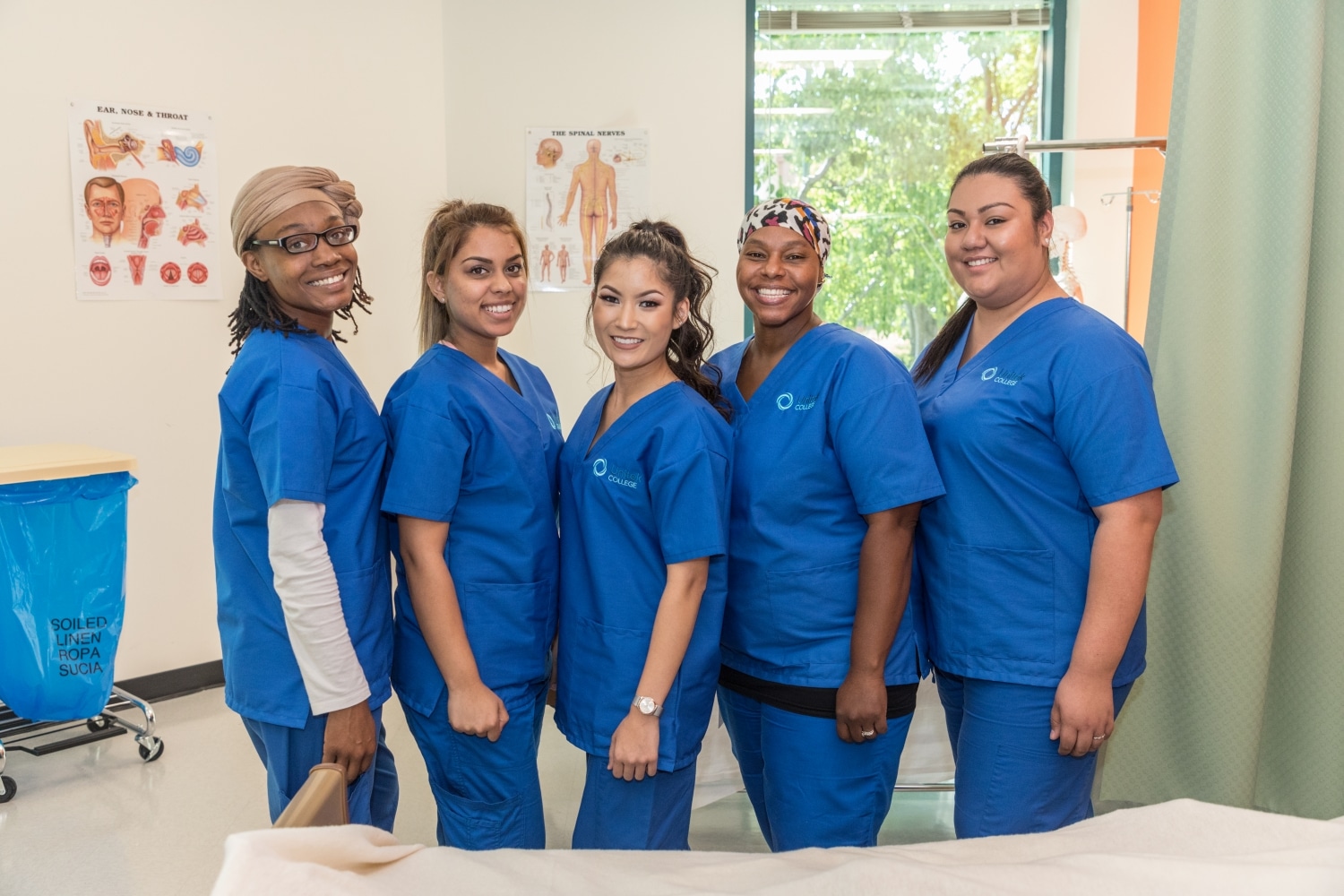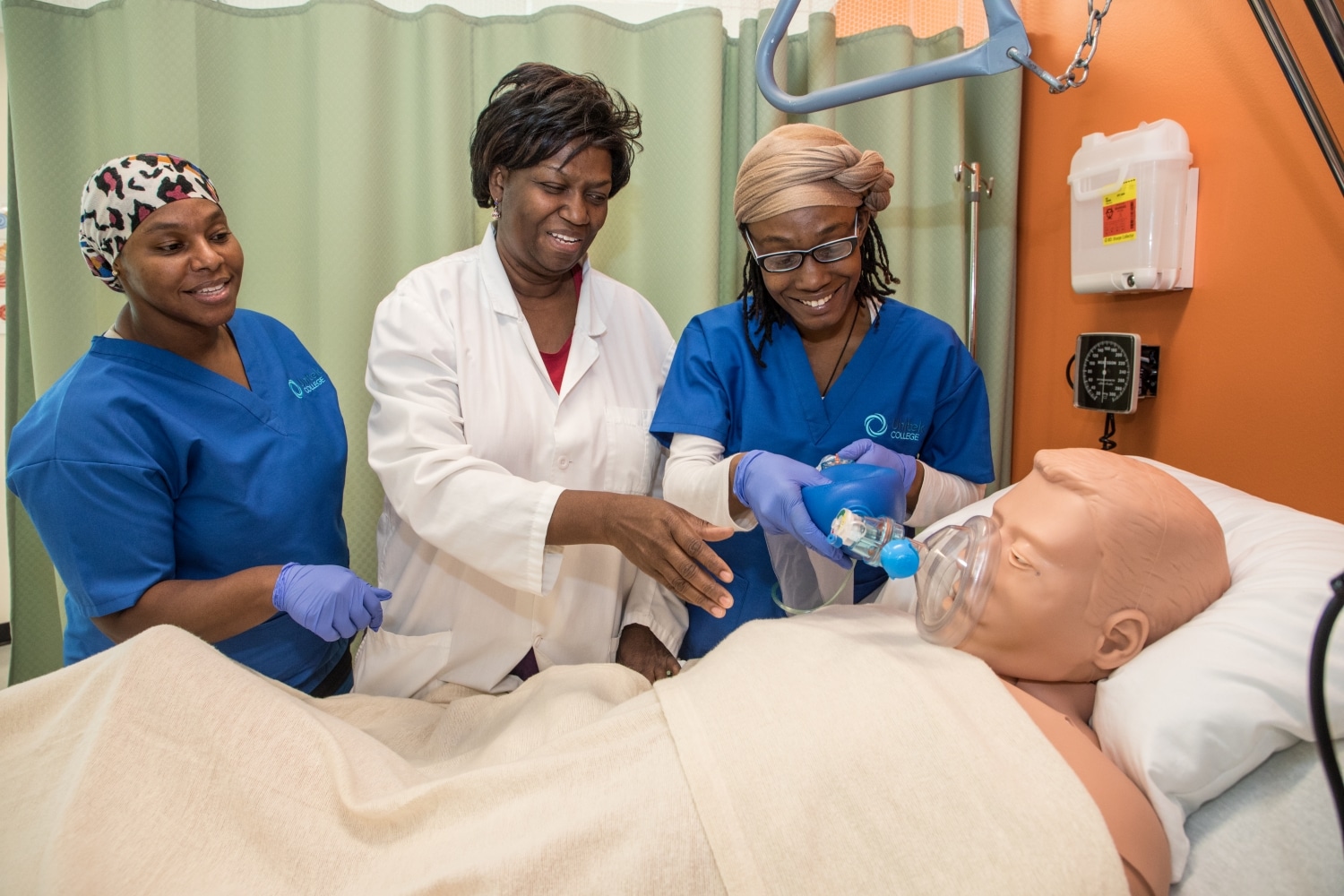How to Become a Licensed Vocational Nurse
Duties, Responsibilities, Requirements, Certifications, Job Outlook, and Salary
If you’re considering a career as a Licensed Vocational Nurse (LVN), and you’re curious about the benefits and requirements that go along with it, this article should serve as a great resource for you. Below you’ll find a wealth of information about how to start your LVN career.
The vocational nursing profession offers numerous benefits, including job stability, varying specialties, and personal fulfillment. If you’re interested in helping others, then you might find your calling as an LVN. Without a doubt, vocational nurses are pillars of strength in the healthcare community.
What is an LVN?
LVN Meaning
A Licensed Vocational Nurse provides patients with quality care and works under the supervision of a Registered Nurse (RN). They perform numerous clinical tasks while assisting patients in hospitals, medical offices, long-term care facilities, convalescent homes, surgical centers, and other settings. In fact, you probably interacted with many LVNs throughout your life.
LVN Job Description
What Does an LVN Do?
Licensed Vocational Nurses, or LVNs, assist in the medical care of patients under the direction of doctors and registered nurses. They care for people who are sick, injured, convalescent, or disabled. LVNs often have more contact with patients than any other member of the healthcare team.
While duties vary depending on the location and employer, the LVN job description typically includes the following:
- Assess and monitor patients
- Report adverse reactions to medication or treatment
- Gather information from patients including their health history and how they are currently feeling
- Administer prescribed medicines
- Start intravenous fluids
- Provide care to ventilator-dependent patients
- Complete a plan of care for a specific patient in long-term care
- Complete insurance forms, pre-authorizations, and referrals
- Work with the interdisciplinary team to help determine the best course of care for a patient
- Teach family members how to care for a relative or teach patients about good health habits
- Supervise nursing assistants and aides
Differences Between LVNs and Other Nurses?
LVN vs. Medical Assistant
Medical Assistants aren’t actually nurses. They’re multi-competent professionals who are involved in administrative and clinical tasks to keep offices, clinics, and laboratories running smoothly. While they assist physicians during examinations, they do not perform as many clinical tasks as LVNs.
Licensed Vocational Nurses require more schooling and a license to practice, which means they have more responsibility within a well-defined scope of practice. Medical Assistants, while often formally trained, do not always need to complete an educational program or gain certification to find employment.
In 2020, Medical Assistants earned a median annual wage of $35,850.
LVNs, on the other hand, earned an median annual salary of $48,820.
LVN vs. LPN
A Licensed Practical Nurse (LPN) is actually another title for Licensed Vocational Nursing. Depending on your location in the United States, one of these job titles will be used. LVN is commonly used in California and Texas, but LPN is the technical title in all other states.
LVNs and LPNs are nursing professionals trained to assist other nurses and physicians. They provide a range of different services for patients. For instance, they might be responsible for providing bedside care, monitoring and recording vital signs, dressing wounds, and updating patient charts. An LVN might also administer prescribed medications or start intravenous fluids.
Both LVNs and LPNs are typically required to complete formal training in order to obtain their license.
According to the U.S. Bureau of Labor Statistics (BLS), they also earn the same median annual wage: $48,820.
LVN vs. RN
Registered Nurses and LVNs both fill vital roles in healthcare. Becoming an RN usually requires an Associate’s Degree in Nursing (ADN) or a Bachelor of Science in Nursing (BSN) degree.
Like LVNs, you’ll also need to pass a licensing exam. RNs must complete several years of schooling, whereas an LVN can complete their schooling in about a year.
RNs complete higher-level nursing tasks. In addition to working with physicians, some RNs oversee LVNs/LPNs, nursing assistants, and home health aides. They also tend to have more opportunities for specialization, such as:
-
- Critical care nurses (work in intensive-care units)
- Cardiovascular nurses (care for patients with heart disease)
- Genetics nurses (provide counseling and treatment for genetic disorders)
- Neonatology nurses (care for newborns)
- Rehabilitation nurses (care for patients with disabilities)
In the U.S., the current median salary for RNs is $75,330 per year.
Comparatively, the median annual wage for LVNs is about $48,820.
LVN Soft Skills
What Qualities Should an LVN Possess?
To become an LVN, you should be:
- Compassionate, as it requires empathy and care toward the people you serve.
- Personal and friendly, as interacting with patients and other healthcare providers is a big part of the job.
- Patient, as dealing with sick and injured people can be stressful.
- Physically strong, as LVNs need to be comfortable performing physical tasks, such as bending over patients for long periods of time.
- Well spoken, as it’s important that LVNs communicate effectively. For instance, they might need to relay information about a patient’s condition to an RN.
- Accurate and detail-oriented, as LVNs help ensure that patients receive the correct care at the right time.
LVN Requirements
What Are the Requirements to Become an LVN?
In the U.S., there are two primary LVN requirements:
- An approved vocational nursing program – There are numerous colleges, universities, and technical schools that offer these programs. The curriculums might include a combination of on-campus instruction as well as online or hybrid classes. Additionally, some schools will offer classes in the day, afternoon, or evening hours.
- State licensure – Post-graduation, LVNs must pass the licensing examination.
LVN Certification
To obtain your license, your state will require you to:
+ Prove that you have graduated from a nursing-board approved VN or PN program.
+ Possibly pass a background check and provide fingerprints.
+ Pass the National Council of State Boards of Nursing (NCLEX-PN) exam.
You will need to renew your license every few years, and your employer will likely ask you to provide documented proof of your license.
The difference between a VN and an LVN is something else that you should keep in mind. When you search for “How to become a Vocational Nurse” and “How to become a Licensed Vocational Nurse,” you’re actually referring to different stages in the educational process. A Vocational Nurse has graduated from a formal program, but a Licensed Vocational Nurse is one who has also passed their licensing exam. Remember: You must be licensed to practice.
Vocational Nursing School
How long does it take to be an LVN?
Higher education and medical training can put large demands on your time as well as your physical and mental energy. If you’re considering an LVN education, the first question on your mind is probably this: How long do you have to go to school to be an LVN?
In some cases, LVN programs can be completed within the span of a year. Having said that, the timeline is dependent on the type of education you’d like to receive. For instance, one of the most common routes is a diploma program.
LVN Diploma Program
If you choose a diploma program, you can expect to study subjects like nursing fundamentals (theory and clinical), pharmacology, maternal and newborn, pediatrics, and professional development. Vocational Nursing programs can vary in course work and curriculum but, if you’re thinking of enrolling into one of these programs, you should look for schools that are best equipped to prepare you for real world experience.
Bonus Option: LVN Degree
If you’d like to build on your education in the future, then you might want to go the extra mile by pursuing an associate degree. In California, you can typically earn a Vocational Nursing degree within the span of year, though you must complete a VN program first. For instance, the ASVN program at Unitek College can be completed in as little as 12 months (again, you must complete a VN program first). This path can lay the groundwork for a higher-level degree, such as a bachelor’s or master’s degree in nursing.
LVN Licensing & Certification
The NCLEX-PN exam is issued by a governmental entity, which provides the public with an assurance of safety and competence. Nurses perform a critical service, and they are the second largest group of licensed professionals in the U.S. It’s vital that they receive the proper credentials.
The National Council of State Boards of Nursing (NCSBN) has developed two exams to test the competence of aspiring RNs and LPNs/LVNs. A graduate (or soon to be graduate) of an approved nursing program would need to complete an application form—which might include a criminal background check—submit the application and licensure fee, and apply for the NCLEX-RN or NCLEX-PN exam.
Passing the NCLEX is an important step toward licensure, but it’s not the only requirement. For instance, some states require proof of English language proficiency, no felony conviction or criminal behavior, sound physical/mental health, and good moral character.

LVN Licensing Renewal
Requirements can vary from state to state. In California, LVNs must renew their license every two years. This process includes completing a number of continuing education courses, possessing a social security number, and certifying whether you have been convicted of a crime since you last renewed your license.
You can submit your renewal online at DCA BreEZe Online Services.
LVN Continuing Education
- Active Licensure. To maintain an active license, you must complete 30 hours of continuing education. Make sure you pass the course(s) in the two-year period before your license is due to be renewed.
- First Renewal. If this is your first license renewal, then you are not required to complete 30 hours of continuing education.

LVN School Cost & Admission
How much does it cost to become an LVN?
Out-of-pocket LVN school costs can vary depending on your individual situation. Cost will also depend on the location, school, and type of program. A typical price range could run anywhere from $5,000 to $50,000.
Some programs might also charge a higher price for more clinical externships or cutting-edge medical equipment. Be sure to research your favored schools and ask the admissions representatives about tuition costs as well as financial aid options. You might be eligible for financial aid, which can cover many college expenses, such as:
- Tuition
- Transportation
- Room and Board
- Books
- Computer Equipment
- Living Expenses
LVN Admissions Requirements
Some LVN schools might have stricter enrollment requirements, but there are also those that don’t; pick the program that is right for you and that best suits your situation. To give you a better idea, here are the bulk of Unitek’s enrollment requirements for the VN program:
- Career planning session and admissions interview
- Submit proof of high school education or equivalent
- Entrance assessment test
- Admissions application
- Enrollment agreement
- Financing arrangements and, if applicable, all documents needed to obtain an official award letter for Federal Student Aid

LVN Jobs
Where Do LVNs Work?
Licensed Vocational Nurses often work with doctors and RNs while providing basic medical care. One moment you could be changing bandages on a patient, and in the next you might be administering medication or starting an IV. Though they can find employment in various settings, LVNs typically work in one of the following facilities:
- Hospitals
- Hospital clinics
- Independent clinics
- Physician offices
- Nursing facilities
- Private healthcare facilities
- Home healthcare services
- Military nursing
- Travel nursing
According to the BLS, the largest employers of LVNs/LPNS are as follows:
- Nursing and Residential Care Facilities
- Hospitals: state, local, and private
- Offices of physicians
- Home healthcare services
- Government
- 38%
- 14%
- 13%
- 12%
- 7%
LVN Work Hours
Many different places employ LVNs, such as hospitals, residential care facilities, clinics, physicians’ offices, and temporary health agencies. Most of these jobs are full time, though some, such as schools, offer part-time schedules.
If you’re thinking about becoming an LVN, it’s good to be conscious of the fact that not all nurses have a typical work schedule. Some facilities require people to be on call, work holidays, or fill extra shifts. Thankfully, the importance of the nursing profession means that there tends to be plenty of job opportunities.
LVN Salary
How much do vocational nurses make?
LVN pay varies depending on your experience, employer, and region. In the United States, cost of living tends to differ from state to state, not to mention from city to city. Needless to say, salary is always important to consider when you change careers.
Vocational Nursing Salary
In May 2020, the median annual wage for LVNs was $48,820.
The lowest 10 percent earned less than $35,570, and the highest 10 percent earned more than $65,520.
Here are the top industries where the highest-earning LVNs work:
- Government
- Nursing and residential care facilities
- Home healthcare services
- Hospitals: state, local, and private
- Offices of physicians
- $51,700
- $50,100
- $49,430
- $46,560
- $44,830
Top States for LVN Employment
Though LPNs/LVNs can often find employment in every state, there are some with more opportunity than others. Currently, the highest paying states for LVNs are Rhode Island, Massachusetts, Alaska, Nevada, and Connecticut.
Here’s the breakdown by location and salary:
- State
- Alaska
- California
- Massachusetts
- Washington
- Nevada
- Average Hourly Wage
- $32.51
- $30.81
- $29.04
- $28.74
- $28.70
- Average Annual Salary
- $67,620
- $64,090
- $60,400
- $59,780
- $59,700
Highest Paying Cities for LVNs
- City
- San Jose, CA
- Santa Rosa, CA
- San Francisco, CA
- Vallejo, CA
- Anchorage, AK
- San Diego, CA
- Hanford, CA
- Napa, CA
- Madera, CA
- Sacramento, CA
- Average Hourly Wage
- $36.51
- $35.97
- $35.83
- $34.78
- $33.65
- $31.68
- $31.40
- $31.33
- $31.27
- $31.24
- Average Annual Salary
- $75,950
- $74,820
- $74,520
- $72,350
- $69,990
- $65,900
- $65,310
- $65,170
- $65,040
- $64,990
LVN Job Outlook
According to the BLS, employment of Licensed Vocational Nurses is projected to grow 9 percent by 2030, which is about as fast as the average for all occupations. The Bureau of Labor Statistics has linked this demand to the aging baby-boomer population. As they head toward retirement, their need for healthcare services is expected to increase at a steady rate.
To keep up with the demand, LPNs/LVNs will be needed in residential care facilities and home health environments. A number of chronic conditions have also become more prevalent in recent years. More nurses will assist patients with these conditions in skilled nursing and other extended-care facilities. Plus, some procedures that had to be done in hospitals are now being performed elsewhere, creating a demand in other settings (think outpatient-care centers).
How to Get a Job as an LVN?
Starting out in the real world or changing careers is never easy. Time and money are two major obstacles to overcome, not to mention the fear of jumping into something new. However, it’s no secret that while some industries are cutting back, healthcare professions are on the rise. One of the best ways to enter this field is to become an LVN.
Here are some practical tips to help you get ahead while looking for that perfect LPN/LVN job.
-
- The first step is to make sure your resume is polished and employer-ready. It’s going to be one of the most vital tools in your arsenal. Think about it: The resume provides hiring managers with an initial glimpse of your skills. Essentially, it’s the first impression you’re going to make. Check for typos, fix messy font, and make sure your skills are displayed concisely and efficiently.
- The second step is to ensure that you’re fully equipped to enter this profession, both emotionally and academically. You will need to be equipped with caring, nurturing, and sympathetic skills. You’ll also be multitasking and interacting with a wide range of personalities. We said this earlier, but remember to take deep breaths and pace yourself!
- The third step is to use the career-services team at your nursing school. They can usually help you with job-search strategies, resume cleanup, and interviews. For instance, the career-services team at Unitek offers mock interviews to better assist graduates. Also, don’t forget to network and make connections in your program—they might be able to help you in your job search, too.
Why Should You Pursue LVN Training?

Aspiring LVNs spend less time in school than RNs. Registered Nurses and doctors spend years in school before practicing in the real world. Many LVN programs can be completed in just one year, allowing them to start their dream career as quickly as possible. If you’d like to become a nurse without spending years in school, Vocational Nursing might be the ideal choice!
This profession has a sunny job outlook for the foreseeable future. As we know, nurses are essential members of the healthcare team, and their job opportunities are only expected to increase in the coming years. Employment of LVNs is projected to grow 9 percent by 2030. This growth will likely afford them a certain degree of stability and job security.
One of the most rewarding aspects of a nursing career is the amount of time that nurses enjoy working directly with patients. Some physicians might feel that, because of their workload, they are unable to spend as much time as they’d like interacting with their patients.
Another rewarding aspect of Licensed Vocational Nursing is the ability to advance within the nursing profession. Some LVNs use their experience to apply to RN programs or RN-to-BSN programs. For example, Unitek offers an advanced placement option for LVNs, called “LVN-to-BSN.” As an RN with a BSN degree, you could receive more job opportunities and management positions.
Overall, LVNs receive valuable exposure and experience. They work alongside doctors and RNs and make a difference in the lives of their patients. At the end of the day, healthcare careers are all about helping others.



